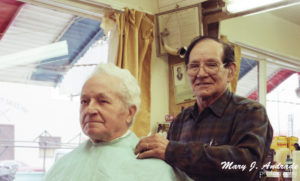John Torres

Durante la década de los años sesenta John Torres fue el Presidente del Programa de Educación para la Ciudadanía y tercer presidente de la Organización de Servicio Comunitario (CSO). Enseñó inglés y proporcionó a los hispanos información acerca de los Estados Unidos, para que pudieran tramitar la solicitud de ciudadanía. Reconocido activista latino, su lugar de negocio era cita no solamente para obtener un corte de cabello, sino también para recibir información sobre cómo encontrar trabajos.
Entre los numerosos premios que él recibió por su entrega y servicio meritorio para los hispanos en San José, está el premio de Reconocimiento de parte de la Legión Americana, el Clifford R. Rodríguez Post 809, que le fue entregado el 25 de febrero de 1955, en el cual se “reconoce y agradece su entrega y profundos esfuerzos al servicio público hacia el mejoramiento de la comunidad”.
<English Version>
John Torres, back in the early 1950’s was Chairman of Citizenship Education and third President of the Community Service Organization (C.S.O.). He taught English and gave information about the US to Hispanics, so they could apply for citizenship. Among the numerous awards he received for his unselfish and meritorious service to the Hispanics in San Jose is a Citation of Recognition awarded him by the American Legion, the Clifford R. Rodriguez Post 809, on February 25, 1955, which “recognized in grateful acknowledgement his unselfish and deeply devoted efforts toward community betterment and public service.” © La Oferta Newspaper.
Ventura Peña

Ventura Peña nativa de Durango, México, nació el 14 de julio de 1915. En 1921 viajó con sus padres quienes se establecieron en El Río, Texas. Contrajo matrimonio a la edad de 21 años en Osona, Texas, donde sus seis hijos nacieron: cuatro varones y dos mujeres.
En 1951 su familia vino a vivir a San José, donde un poco más tarde fue una de las primeras personas en unirse al recién formado Club Libertad, con Ramona Sariñana, el cual fue fundado en 1968. Ella comentaba que durante las primeras reuniones, todos llevaban un platillo de comida para compartir. Cuando las reuniones se cambiaron de la casa de Ramona a un edificio más grande, ella actuó como voluntaria, trabajando intensamente en la preparación de las comidas para los ciudadanos de edad avanzada, que acudían al Club Libertad. Una de las formas de obtener dinero para pagar el alquiler del edificio, era a través de la venta de artículos hechos con crochet y con la máquina de coser.
Ventura Peña fue miembro de varios grupos, C.S.O. funcionaba en el Club Libertad, compartiendo el edificio. Ella pertenecía a la organización religiosa Los Guadalupanos de San Pablo, California, reuniéndose socialmente cada mes, a la vez que pertenecía a la Logia Progresita # 54, la única organización que extendía seguro a sus miembros.
<English version>
Ventura Peña a native of Durango, Mexico, was born on July 14, 1915. In 1921 her parents moved to El Rio, Texas. She married at age 21 in Osona, Texas, where her four boys and two girls were born.
In 1951 she moved to San Jose, and later was one of the first persons to join the newly formed Club Libertad, which Ramona Sariñana founded in 1968. She commented that in those early meetings, each one would bring food for a potluck. When they moved their meetings out of Ramona’s home to a bigger building, she was a volunteer, working very hard preparing the meals in Club Libertad’s kitchen for senior citizens. One of the ways the members made money to pay the building’s rent was through the sale of sewing and crochet items they made.
Ventura Peña participated in many groups, one of them was as a member of Club Libertad which functioned with the Community Service Organization, sharing the same building in San Jose. Another organization she participated was a religious one: Los Guadalupanos of San Pablo, California, meeting socially every month, and also was a member of Logia Progresista # 54, the only Mexican organization that issued insurance to its members. © La Oferta Newspaper.
Josefa Segura
Josefa Segura nació en Chihuahua, México. De ahí se mudó al Paso, Texas, luego a Colorado y finalmente a Santa Clara, en 1942. Ese mismo año ella comenzó a trabajar en una fábrica enlatadora de frutas y vegetales, hasta que se jubiló en 1971.
Ella prefería asistir al Club Esperanza en San José porque allí podía conversar en español y, además, porque los miembros eran de México. Ella comentaba: “Todos ayudan voluntariamente en el Club, ya sea lavando platos, cocinando, arreglando sillas – lo que se necesite hacer”.
Pertenecía también al Grupo Latinoamericano de la Iglesia de Santa Clara. “Si no perteneciera a estos grupos, pasaría sola en mi departamento”. Cada cierto tiempo ayudaba también a preparar la comida con el Grupo Latinoamericano de la iglesia.
<English version>
Josefa Segura was born in Chihuahua, Mexico. From there she moved to El Paso, Texas, later to Colorado, finally to Santa Clara in 1942. That same year she started working for a cannery until her retirement in 1971.
She used to attend Club Esperanza in San Jose because she could speak Spanish there and because most of the members were from Mexico. She said, “Everyone volunteers their help at the Club, be it washing dishes, cooking, setting up chairs – whatever is needed.”
She also belonged to Grupo Latinoamericano of Saint Claire Church. “If didn’t belong to these groups, I would spend my time in my apartment alone.” From time to time, she helped to prepare meals with the Grupo Latinoamericano at the church. © La Oferta Newspaper.






